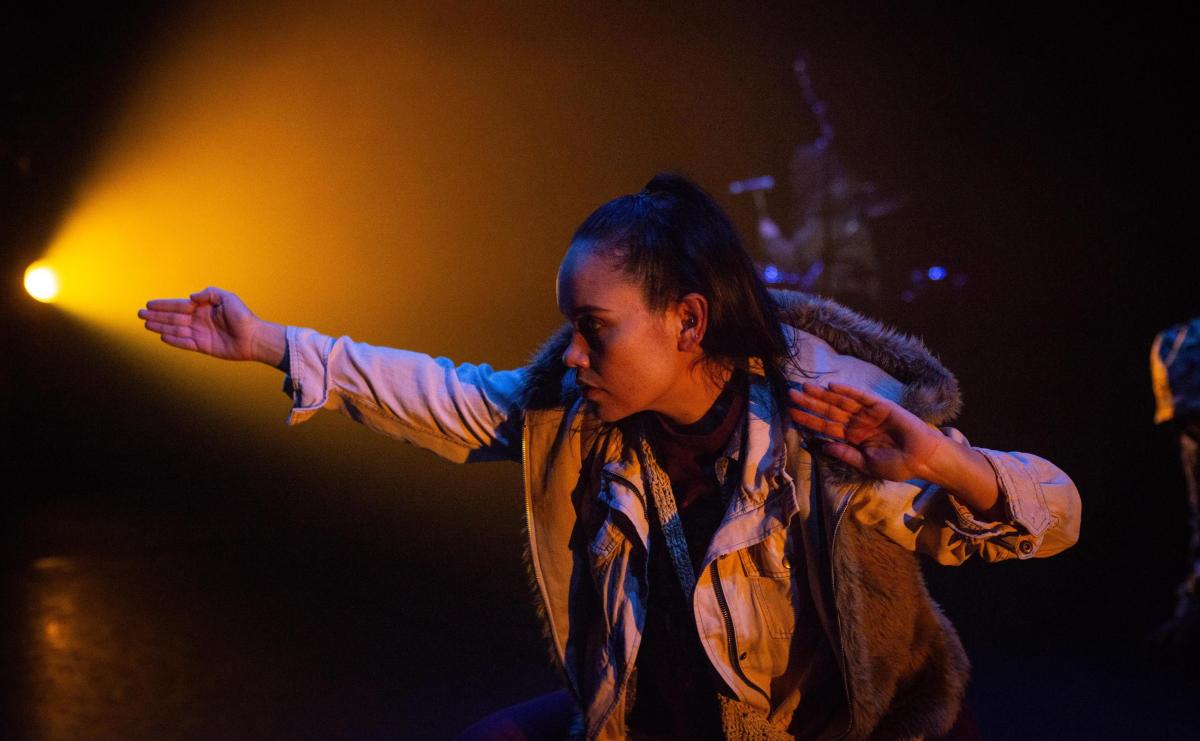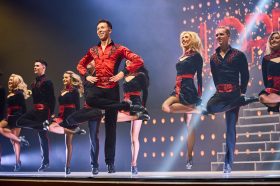Louise Bezzina, Artistic Director of Brisbane Festival, says she never considered cancelling this year’s festival despite the impact of COVID-19.
‘No,’ she said, when asked if that was ever a possibility. ‘No, no, no, no, no, no, no!’
With Australians emotionally and economically bruised and battered by the pandemic, and with 816 deaths confirmed nationally at the time of writing, an artistic showcase like Brisbane Festival is now more important than ever, Bezzina believes.
‘As the innovators, as the change-makers, as the creatives, it’s up to us to set the course, to re-establish the route [out of COVID]. This festival certainly wasn’t the festival that I had intended on presenting this year, but it’s the festival that we need at the moment,’ she told ArtsHub.
Featuring Street Serenades (a series of pop-up music performances in all 190 Brisbane suburbs), laser installations lighting up the city each Friday and Saturday night, and huge, party-hat wearing finches perched on significant Brisbane landmarks, this year’s festival has been designed to rekindle a sense of joy after the stress and anxiety of Coronavirus.
‘We talk a lot about surprise and delight this year. And it can sound like a marketing term, but we are trying to surprise and delight people. We really are,’ Bezzina said.
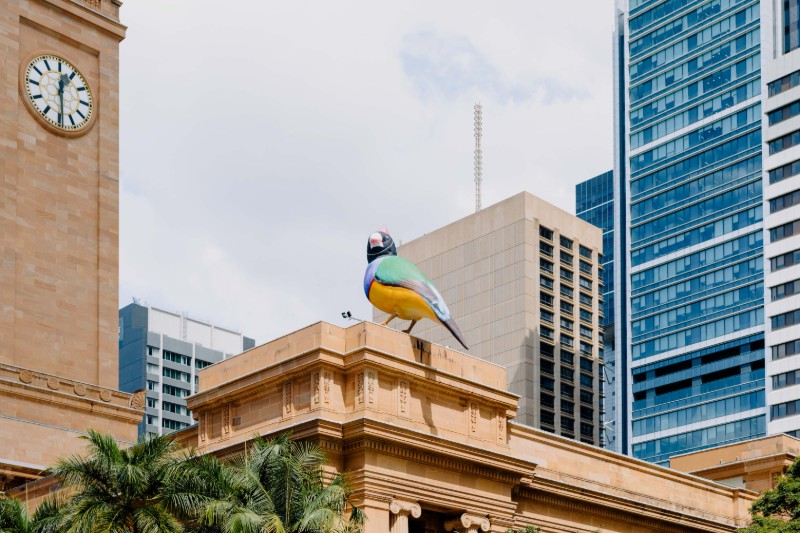
Florentijn Hofman’s Messengers of Brisbane. Photo credit: Atmosphere
The festival, which runs until 26 September, has been ‘very much made for the people of Brisbane and anybody who is able to travel to the city and enjoy it,’ she continued.
‘I mean, of course, every artistic director wants five-star reviews, but this is actually all about audiences and people and artists – artists having an opportunity to make and inspire and connect. And I can see it happening all across the city. Every single day there is another moment where [the festival] is absolutely transcending this extraordinary moment in time.’
Read: How to deliver a festival during a crisis
While there are clear challenges in presenting events such as Street Serenades, given the present risks associated with public gatherings, Bezzina said the joy such events bring to all involved far outweighs the challenges of staging them.
‘The real challenge with those concerts is that we’re balancing a very fine line of having just enough people, not enough people, and too many people – so we’re trying to strike that balance, but those who do come and see it are absolutely thrilled by whatever genre of music they get to experience,’ she explained.
‘And then the other great thing about the Street Serenades program – and I watched this all over the first weekend – I would turn up at a particular location, for example, seeing The Australian Voices in one of the parks in Alderley, one of our inner north suburbs. At first there weren’t many people there, but by the end of it, the power of live music just seemed to draw people out of their homes and out of the surrounding area to come and experience this beautiful gift of music.’
Brisbane’s musicians have also embraced Street Serenades. ‘To hear all the artists who start off their show, every single one of them saying, “It is so great to be performing live to people again,” they’re all so grateful.’
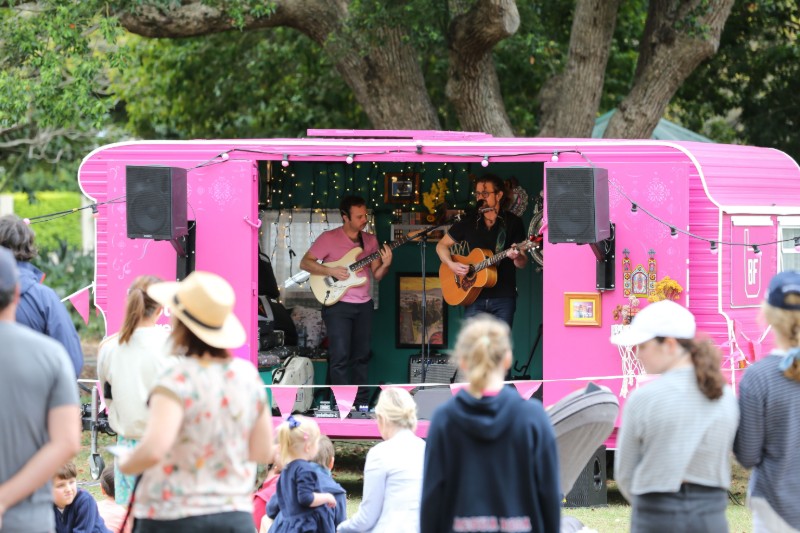
Tyrone Noonan at Street Serenades. Photo credit: Atmosphere.
Other aspects of the festival program, such as Circa’s Leviathan and works at the newly-opened Metro Arts have also been warmly received, and there are many more to come, including works by Queensland companies such as The Good Room and The Farm, as well as a strong visual arts program.
Read: Metro Arts opens fit-for-purpose new home in Brisbane’s West End
The opening night of Thomas E. S. Kelly’s Silence at Brisbane Powerhouse was especially powerful, Bezzina noted – partially because of its powerful aesthetics and politics, but also because of what it says about the future.
‘It was a really momentous occasion; an absolutely powerful and poignant production … I’ve been following this project from the very beginning and Thomas has created something truly remarkable that I hope will have a very long life, not only in Australia but internationally. It’s a very important piece,’ Bezzina said.
‘It’s also amazing to see what an artist can achieve when they are given the resources and the time, and that’s a real credit to BlakDance in the way that they’ve supported Thomas and Karul Projects.’
Coupled with additional works, including Richard Bell’s installation Embassy and Digi Youth Arts’ remake-regenerate-reclaim, the success of Silence speaks to the future of First Nations programming at Brisbane Festival.
‘Going forward, we have our Blak Curatorium that we have appointed, and the intention behind that is for First Nations programming choices to be led and made by First Nations artists and curators. We’ve just kind of started out on our journey and Silence and Embassy and remake-regenerate-reclaim are just some of the beginnings of those curators’ programming choices, but it’s an exciting time – a way to really shift the paradigm of how we move forward and with the right people making the right decisions,’ Bezzina said.
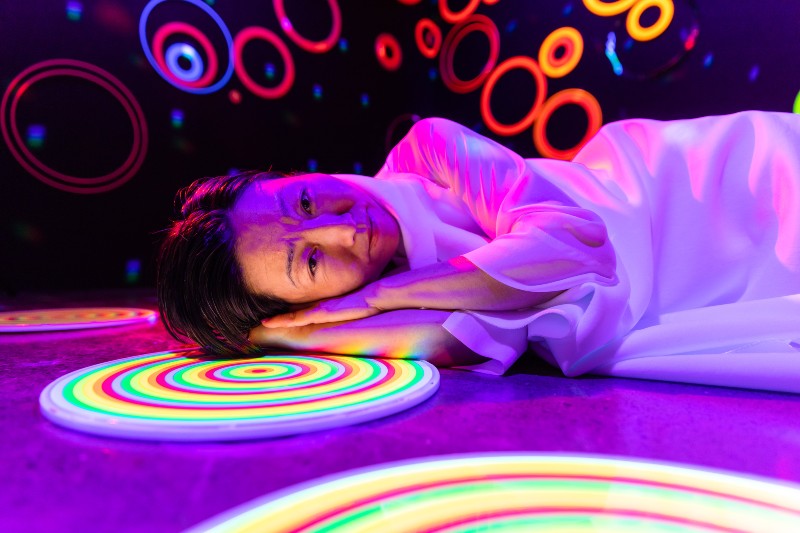
Hiromi Tango’s Brainbow Magic at Metro Arts. Photo credit: Atmosphere.
Behind the scenes
When it comes to staging this year’s Brisbane Festival, Bezzina is quick to acknowledge the role played by her ‘magnificently supportive board, whose job is to look at the risks,’ and for whom continuing with the festival amid the pandemic was ‘a really confronting proposition,’ but who nonetheless could clearly see the benefits of going ahead with a revised festival program.
She also credits the hard work done behind the scenes by the festival’s CEO, Charlie Cush.
‘I have to give full credit to my colleague Charlie,’ she said. ‘We 100% did this together in looking at how we were going to split things up so we could find a way to show not only, from my side, the artistic integrity, but also the business nous, the risk assessment, the community engagement, so we could really show that we had thought about everything,’ she said.
‘And then there’s the COVID-safe plans and the considerations that the whole team have put in place to ensure that people remain safe, well and still get to enjoy this experience. Because we feel a great sense of responsibility; we have to absolutely do all the right things.’
Read: What Darwin Festival learned about operating in a pandemic
With Darwin Festival having recently presented its own locally focused program for 2020, Bezzina said she appreciated being able to reach out to her Northern Territory colleagues to discuss their experiences and challenges over recent months.
‘I think because every government has their own set of rules around COVID plans, there were a lot of things that we had to navigate on our own, but I really enjoyed my conversations with Felix [Preval, Darwin Festival’s Artistic Director] … and it was wonderful to watch the Darwin Festival from afar and to see how well received the festival was. It was really exciting. I’m extremely proud of those guys, they did a remarkable job.’
Similarly, Bezzina is happy to share her COVID-learnings with other Festival Directors around the country.
‘We’ve already made the offer to our other colleagues around the country, that we’re happy to help in any way we can and share the knowledge that we have now acquired in order to deliver a festival in a pandemic.’
